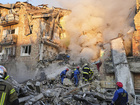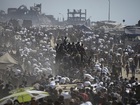The death toll in a major Russian missile and drone strike on the Ukrainian capital rose to 23, including four children, officials said Friday, as U.S.-led efforts to end the three-year war remain stuck in apparent limbo.
Authorities in the Kyiv region declared Friday an official day of mourning. Flags flew at half-staff and all entertainment events were canceled after Russia hammered Ukraine with almost 600 drones and more than 30 missiles overnight from Wednesday to Thursday, including rare strikes on downtown Kyiv.
 Full Story
Full Story
Israel's military has suspended mid-day pauses to fighting, which had allowed the delivery of humanitarian aid to Gaza City, saying on Friday that the city was now "a dangerous combat zone."
The city was among the places that Israel paused fighting last month to allow food and aid supplies to enter from 10 a.m. to 8 p.m.
 Full Story
Full Story
As more Palestinian refugee camps handed over caches of weapons to the Lebanese army this week, a Lebanese government official told The Associated Press that the disarmament effort could pave the way for granting Palestinian refugees in Lebanon more legal rights.
Ramez Dimashkieh, head of the Lebanese-Palestinian Dialogue Committee, a government body that serves as an interlocutor between Palestinian refugees and officials, said his group is working on proposed legislation that they hope to introduce by the end of the year that could improve the situation of Lebanon's approximately 200,000 Palestinian refugees.
 Full Story
Full Story
North Korean leader Kim Jong Un will make his first visit to China in six years to attend a military parade next week, the two countries said Thursday, in an event that would bring him together with a large group of world leaders for the first time since taking office in late 2011.
With Russian President Vladimir Putin also coming for the parade, the event will underline the three-way alignment among Beijing, Moscow and Pyongyang in the face of a U.S. push to bolster its alliances with South Korea and Japan.
 Full Story
Full Story
Rescuers in boats raced to reach stranded families in Pakistan's populous eastern Punjab province Thursday, after three major rivers burst their banks because of heavy rain and the release of water from overflowing dams in neighboring India.
The floods displaced nearly 250,000 people and officials said more than 1 million people were affected, with crops and businesses destroyed and many unable to leave their homes.
 Full Story
Full Story
Climate change that has driven scorching temperatures and dwindling rainfall made massive wildfires in Turkey, Greece and Cyprus this summer burn much more fiercely, said a new study released Thursday.
The study by World Weather Attribution said the fires that killed 20 people, forced 80,000 to evacuate and burned more than 1 million hectares (2.47 million acres) were 22% more intense in 2025, Europe's worst recorded year of wildfires.
 Full Story
Full Story
Pope Leo XIV demanded Wednesday that Israel stop the "collective punishment" and forced displacement of Palestinians in Gaza as he pleaded for an immediate and permanent ceasefire in the besieged territory amid preparations by Israel for a new military offensive.
Leo was interrupted twice by applause as he read aloud his latest appeal for an end to the 22-month war during his weekly general audience attended by thousands of people in the Vatican's auditorium.
 Full Story
Full Story
Iran's ambassador to Australia was seen preparing to leave the country on Thursday, days after Prime Minister Anthony Albanese ordered him to leave over accusations that Tehran masterminded at least two antisemitic arson attacks in the country.
Local television stations Network Seven and Network Nine spoke to Ambassador Ahmad Sadeghi as he headed for a flight at the airport in Sydney.
 Full Story
Full Story
An aid convoy entered the city of Sweida in southern Syria via the main highway from Damascus on Thursday, for the first time since a major outbreak of sectarian violence last month shook the country's fragile recovery from nearly 14 years of civil war.
Clashes broke out in mid-July between government forces and local Bedouin tribesmen on one side, and fighters from the country's Druze minority on the other. Hundreds were killed and tens of thousands displaced, and allegations have surfaced of government fighters executing Druze civilians and looting and burning houses.
 Full Story
Full Story
A paramilitary group fighting against Sudan's military shelled a besieged city in the western region of Darfur, killing at least 24 people, a medical group said Thursday.
The Rapid Support Forces shelled the densely populated areas of the central market and Awlad al-Reef neighborhood in el-Fasher, the provincial capital of North Darfur province, according to the Sudan Doctors Network, which tracks the country's civil war. The attack wounded 55 people, including five women, it said.
 Full Story
Full Story



